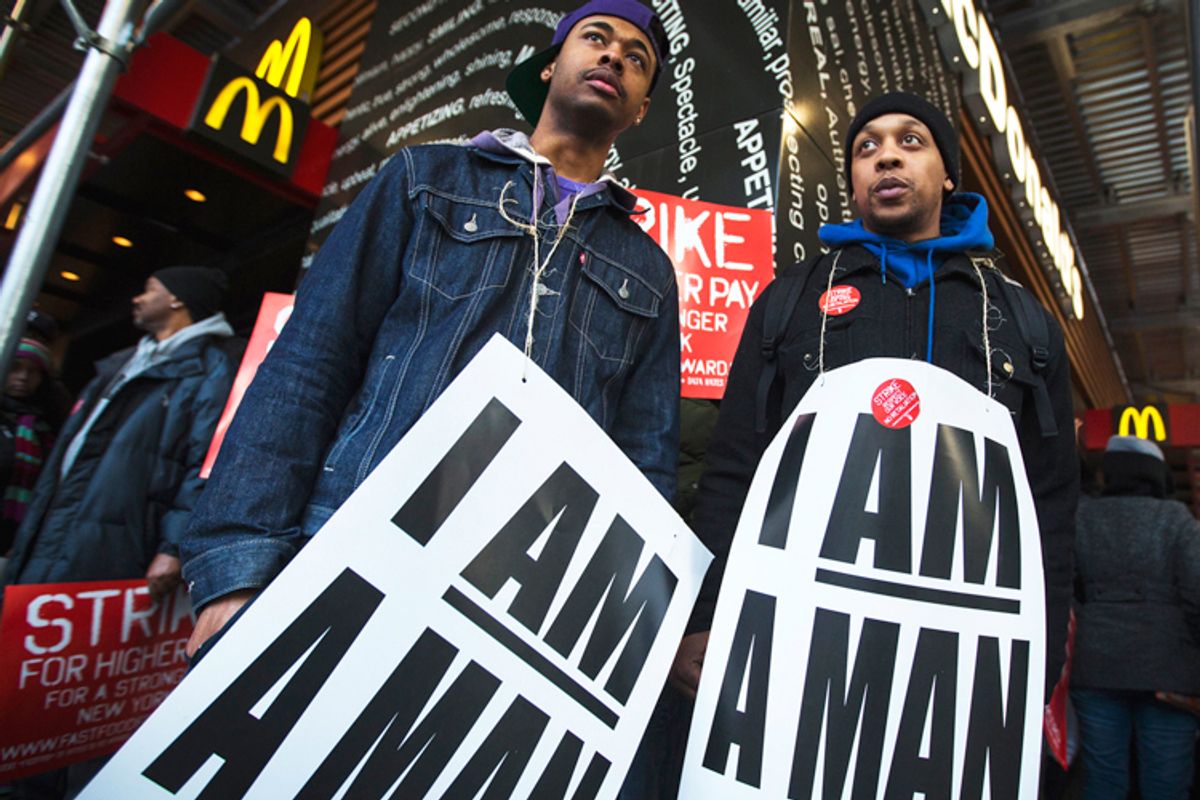Fast food workers are going on strike from New York to Seattle to demand higher wages, highlighting the never-ending controversy over the consequences of raising the minimum wage. Many news stories seem to suggest that economists have decided a higher minimum wage will cause job loss. However, with more analysis, we undercover the truth: there is no clear link between a higher minimum wage and reduced employment.
John Schmitt, a Senior Economist at the Center for Economic and Policy Research, reported in February 2013 that multiple meta-studies (studies that use statistical techniques to analyze a large amount of separate studies) found that for both older and current studies alike, there is no statistical significance in the effect of an increased minimum wage. Put plainly, if the effect is not statistically significant, then there is no proven effect— increases in the minimum wage do not cause job loss.
Accordingly, a few weeks ago, over 100 economists at organizations ranging from the Center for American Progress to Boston University signed a petition in support of increasing the minimum wage. They present current research from well-established organizations such as the National Bureau of Economic Research that shows there are no negative employment effects from minimum wage increases. This includes the most comprehensive data available, based on the increasingly accurate testing that has occurred as more and more states increase minimum wage levels. Even more importantly, this recent series of studies use cutting-edge econometric techniques to control for extraneous variables such as economic downturns and geographic effects. When economists do that, they find that minimum wage increases do not reduce employment.
Logically, this makes a lot of sense. A higher minimum wage is a win-win situation economically: employees have more money to be consumers and are more productive, while businesses wind up reducing costs in the long run, since they won’t have to spend as much money hiring and training new workers (by analyzing data from five separate studies, economists representing the Political Economy Research Institute found that McDonald's could easily make up for the costs of a higher minimum wage with a mere five cent price increase on Big Macs). It’s just as Henry Ford realized—when he paid his workers more, they became part of his customer base, making his company even more profitable. Increasing the customer base and expanding customer pockets helps stimulate the entire economy, badly needed in the current recession.
So if we have no evidence linking high wages to job loss, our next question is: are higher wages needed as a poverty reduction tool?
Currently, the 2013 Federal Poverty guidelines stipulate $23,550 for a family of four as poverty level. A $7.25 minimum wage currently nets the protesting fast food workers $15,080 a year if the workers are lucky enough to work 40 hours a week. In a typical household with two parents and two children, parents who make $7.25 earn far below the living wage of $13.55, according to an MIT wage calculator. The numbers become even starker when you separate out true living expenses: food, medical care, housing, transportation, and other needed expenses add up to a required $37,540 annual income before taxes, which is notably different than the poverty guidelines that the U.S. Department of Health & Human Services set. Even if the two parents worked 40 hours a week for 52 weeks, they would only earn $30,160 in total, significantly below the resources they need to live. Moreover, these estimates are only for a typical nuclear family. The struggle that single-income families, large families, or families living in high-cost cities go through is exponentially higher.
The buying power of minimum wage has steadily been waning due to the effects of inflation for the past 40 years. When prices increase, a worker’s paycheck buys less and less. To put it in perspective, we look to another brief by John Schmitt: if minimum wage had continued to match productivity growth, it would have been $21.72 per hour in 2012. If we only adjust for the cost of living, a minimum wage pegged to inflation would be $10.52.
A huge bulk of evidence makes the case that increasing the minimum wage is a doable, efficient, and necessary change for the economy. This change needs to happen now. We as Americans have a moral obligation to make sure that other Americans who are working hard to support themselves and their families are able to make a living.
Emily Chong is a junior at Vanderbilt University and a Roosevelt Institute | Campus Network Summer Academy Fellow interning with the Rediscovering Government initiative.


Shares